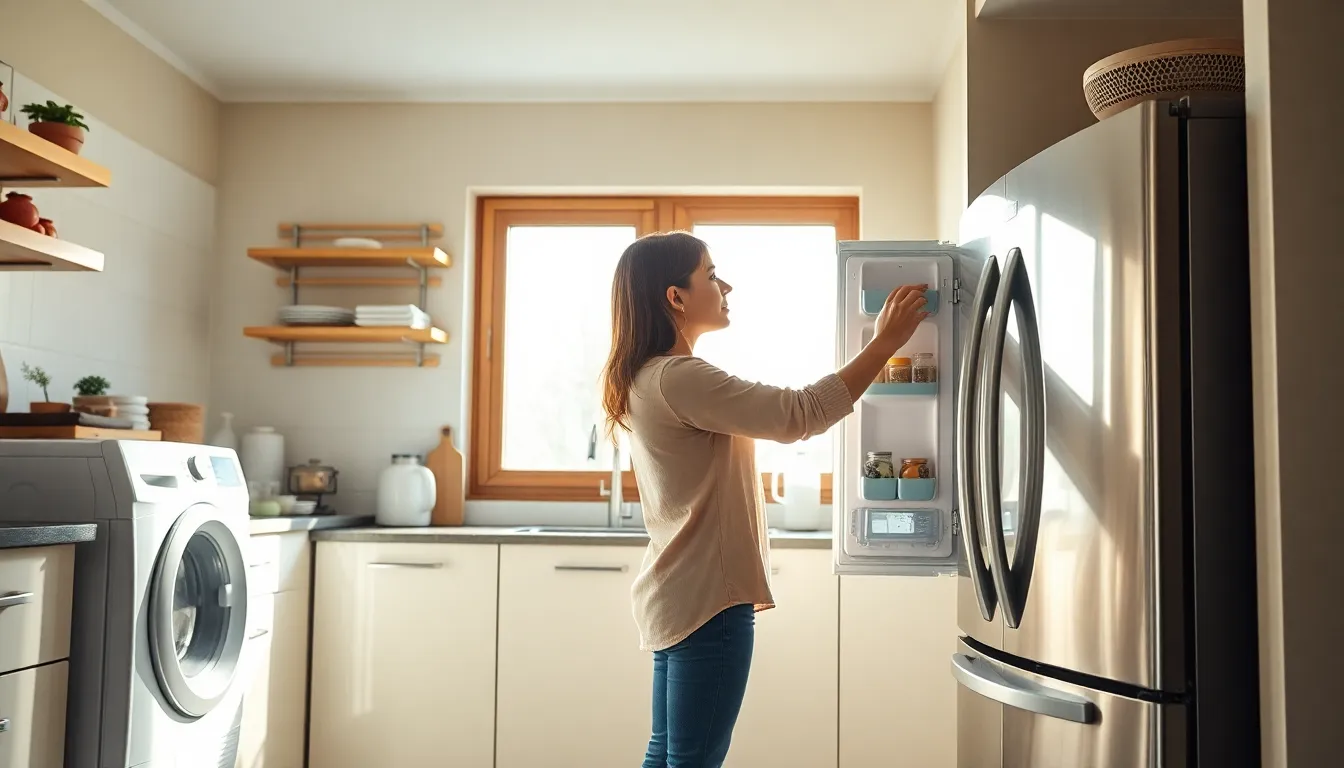In a world where energy bills seem to rise faster than a cat on a hot tin roof, finding ways to save energy has never been more crucial. Not only does cutting down on energy consumption lighten the load on your wallet, but it also helps Mother Earth breathe a little easier. Who knew saving the planet could be as simple as switching off a light or unplugging that ancient toaster that hasn’t seen a slice of bread in years?
Table of Contents
ToggleEnergy Saving Tips for Your Home
Reducing energy consumption at home not only lowers bills but also contributes to environmental protection. Implementing a few key strategies can make a significant difference.
Insulation and Weatherproofing
Proper insulation plays a crucial role in maintaining comfortable indoor temperatures. Use products like fiberglass or foam boards to improve thermal resistance in walls and attics. Weatherproofing around windows and doors keeps drafts at bay. Seal gaps with caulk or weatherstripping to enhance energy efficiency. Adequate insulation in homes can save up to 20% on heating and cooling costs. Regularly check insulation levels, especially in older houses, to ensure effectiveness.
Efficient Heating and Cooling
Efficient heating and cooling systems drastically reduce energy use. Look for ENERGY STAR rated appliances, which operate more effectively than standard models. Programmable thermostats allow users to set temperatures based on schedules, saving energy when no one is home. Regular maintenance, including filter changes, ensures optimal functioning. Ceiling fans can circulate air and reduce reliance on air conditioning, making a comfortable environment effortlessly. When combined, these strategies can cut energy costs significantly.
Energy Saving Tips for Appliances

Choosing the right appliances and maintaining them properly can significantly lower energy costs.
Choosing Energy-Efficient Models
Selecting appliances labeled as ENERGY STAR qualifies consumers for efficiency. These models typically consume less electricity than standard options. Energy-efficient refrigerators, washers, and dryers can lead to savings of 10-50% or more on energy bills. Considering smart appliances also enhances energy savings while providing convenience. Look for features that allow remote monitoring and control, contributing to optimized energy use when needed. Consumers investing in energy-efficient appliances not only save money, but also reduce environmental impact.
Proper Maintenance Practices
Regular maintenance extends the lifespan of appliances, ensuring they operate efficiently. Cleaning filters in refrigerators and dryers can reduce energy consumption significantly. Scheduling routine checks for heating and cooling systems optimizes performance and conserves energy. Sealing refrigerator doors prevents cold air loss, saving resources. Inspecting insulation around water heaters also minimizes energy waste. Performing these simple maintenance tasks fosters energy efficiency and lowers utility bills.
Energy Saving Tips for Daily Habits
Integrating energy-saving habits into daily routines significantly reduces energy consumption. Following simple, practical strategies enhances efficiency and promotes sustainability.
Smart Usage of Electronics
Utilizing power strips allows for easy management of multiple devices. They can cut off power to all electronics with a single switch, reducing phantom energy use. Scheduling device usage during off-peak hours helps take advantage of lower energy rates. Opting for energy-efficient settings on appliances ensures minimal energy consumption. Regularly updating devices can also maximize their efficiency and performance.
Water Conservation Techniques
Adjusting shower times to under ten minutes can lead to substantial water savings each month. Installing low-flow showerheads and faucets reduces water usage without sacrificing pressure. Fixing leaks promptly prevents water waste and unnecessary costs on bills. Collecting rainwater for irrigation provides an eco-friendly alternative to tap water. Choosing drought-resistant plants for landscaping can lower dependency on regular watering.
Energy Saving Tips for the Outdoors
Boosting energy efficiency outdoors can lead to significant savings and environmental benefits. Effective strategies can restructure outdoor spaces while minimizing energy consumption.
Landscaping for Energy Efficiency
Utilizing native plants enhances energy efficiency. Native species often require less water and fertilizer, reducing ongoing maintenance costs. Strategic placement of trees provides shade and lowers cooling costs in summer months by blocking direct sun. Additionally, consider using shrubs or plants that act as windbreaks, which can reduce heating costs during winter. Grouping plants by their water needs minimizes waste and supports efficient irrigation practices. Creating a rain garden can effectively capture runoff while improving groundwater recharge, showcasing eco-friendly landscaping that promotes sustainability.
Outdoor Lighting Solutions
Choosing energy-efficient outdoor lighting significantly reduces electricity use. LED lights consume up to 80% less energy compared to traditional incandescent bulbs and last much longer. Installing motion sensors for lights enhances security while preventing unnecessary energy consumption when areas are unoccupied. Solar-powered lights provide an excellent alternative, using sunlight for power and eliminating electricity costs entirely. Positioning outdoor lights to illuminate pathways and entry points enhances safety without excessive energy draw. Timers can limit usage to specific hours, ensuring lights operate only when needed, further optimizing energy savings.
Embracing energy-saving practices can lead to significant financial benefits and a positive impact on the environment. By implementing simple changes in daily routines and making informed choices about appliances and home improvements, individuals can contribute to a more sustainable future.
From optimizing insulation to utilizing energy-efficient appliances and adopting mindful habits, every effort counts. The combination of indoor and outdoor strategies creates a holistic approach to energy efficiency.
Ultimately, these actions not only reduce energy bills but also foster a sense of responsibility toward the planet. Adopting these tips today can pave the way for a brighter and more sustainable tomorrow.



